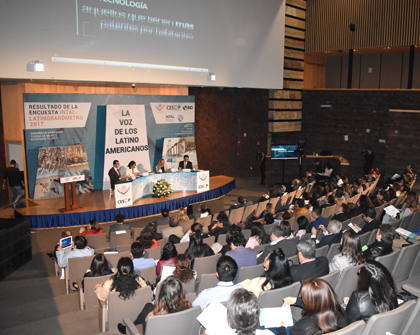The INTAL Winter Colloquium was attended by US ambassador Noah Mamet, Argentina’s chief of staff, Marcos Peña, and the country’s minister of production, Francisco Cabrera. The main topic of discussion was the need to add value to exports and diversify the export basket.
What part can small and medium-sized enterprises in Latin America and the Caribbean play in this process? How can they adapt to technological changes and transformations in global value chains? How can we increase the productivity of the service sector and make it more competitive?
The event was organized by the Institute for the Integration of Latin America and the Caribbean (INTAL), part of the Integration and Trade Sector (INT) of the Inter-American Development Bank (IDB), in partnership with Argentina’s Ministry of Production and the Inter-American Dialogue. SMEs and their role as role as service providers were the focus of proceedings.
There were presentations on this topic from IDB trade and integration specialist Federica Gómez Decker, and Gustavo Crespi, lead specialist in science and technology at the IDB’s Competitiveness, Technology, and Innovation Division.
Ms. Gómez Decker argued that it is fundamental for Latin America and the Caribbean to take advantage of the opportunity that the global service trade represents. “To achieve this, improving the national regulatory framework is vital, as is creating a good business environment for service companies,” she said. She also emphasized the need to move beyond systematic statistical limitations on exports of services and argued that the sector is capable of handling adverse situations.
“It is crucial to avoid crowding out in staff training programs and complement the education options on offer,” said Ms. Gómez Decker, whose presentation revolved around niches of demand where there are competitive advantages, which in Uruguay include business services, ICTs, architecture and engineering, and the health sector.
The next speaker, Gustavo Crespi (link in Spanish), underlined that the service sector employs more than 60% of Latin Americans and that within this sector, SMEs play a vital role in job creation. However, he said that the stumbling block for growth is productivity. To increase productivity, he recommended reallocating resources, improving static efficiency in this allocation process, and generating new knowledge-intensive services, where Latin America has the potential to become a platform for innovation.
Increasing Productivity in the Service Sector
Source: Gustavo Crespi’s presentation at the INTAL Winter Colloquium.
According to Mr. Crespi, “services are here to stay,” but active, focused public policies are needed to promote innovation, especially within SMEs. On the basis of its natural resource platform, the region could build services into one of the pillars supporting its future development.






